Step 8: Preparing for Amends
In this session, we’ll be completing the re-establishment of our interconnections with our fellow women and men and any organizations or institutions we’ve harmed by our old attitudes and behaviors. We’ll begin this process by putting into practice Step 8:
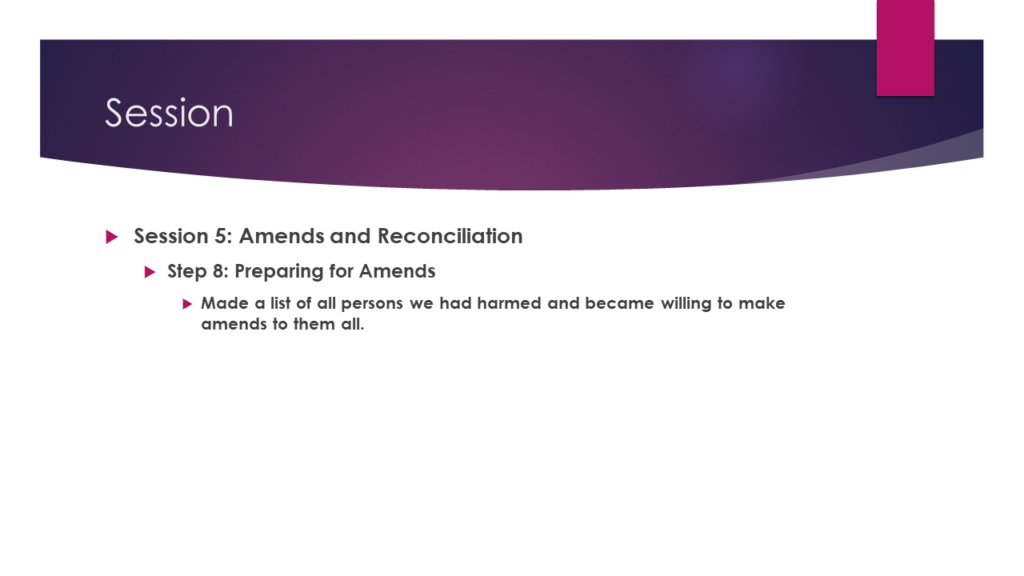
“Made a list of all persons we had harmed and became willing to make amends to them all.” Right now, before you let your imagination run away with you, stop. It’s true that in Step 9, you’ll be asked to make amends to those people and institutions that you’ve harmed. But not yet! Step 8 is a critical preliminary step that has to be carefully done before you can even think about undertaking Step 9. It’s not to be rushed into. The virtues of patience and humility are requirements for completing this process successfully.
You’ll need to do two things to complete Step 8.
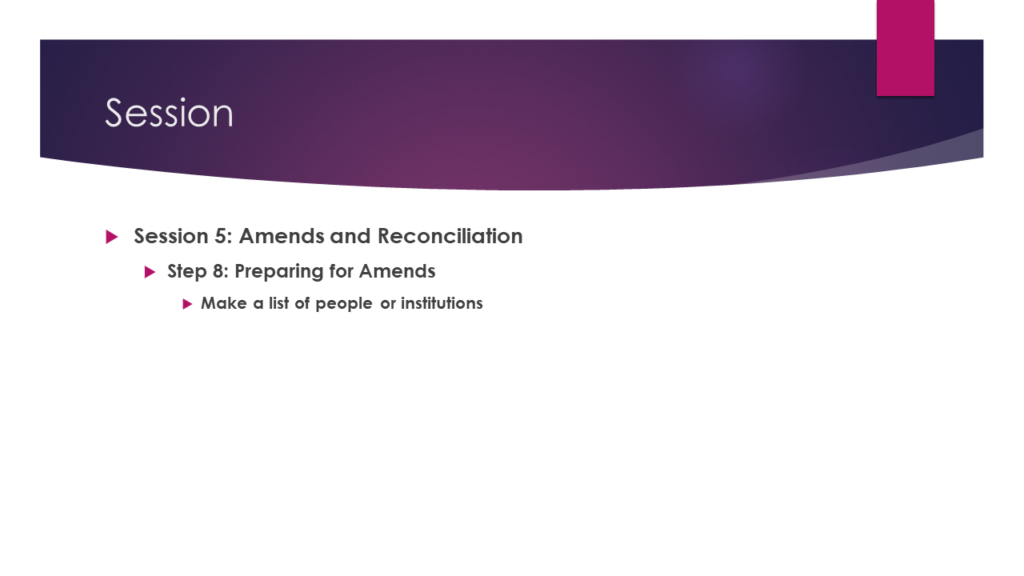
First, you’ll need to make a list of prospects. Keep in mind that not all of these prospects will make the final cut. Don’t let the length of the list discourage you.
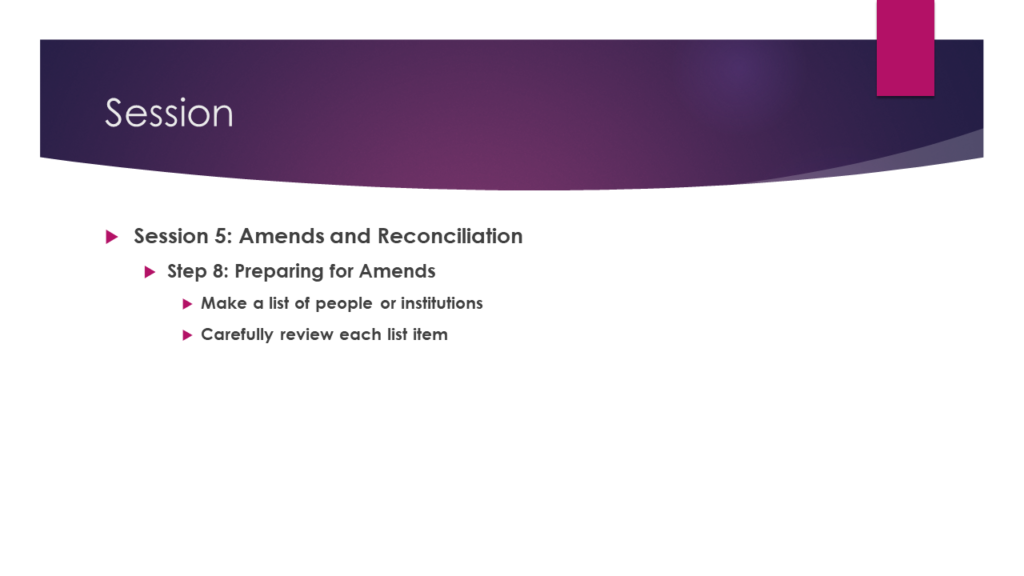
Once you’ve made the list, you’ll need to review carefully each prospect you’ve entered. I strongly recommend that you do this with your most trusted advisor…perhaps the person with whom you shared your fifth step.
As you might have guessed, I’ve created a new form for you (this’ll be the last one). If you haven’t downloaded it, please do so now. You can download or print the Step 8 Inventory Sheets (in Excel or .pdf format) here:
Printable Step 8 Inventory (.pdf)
Fillable Step 8 Inventory (.xlsx)
Here is the form:
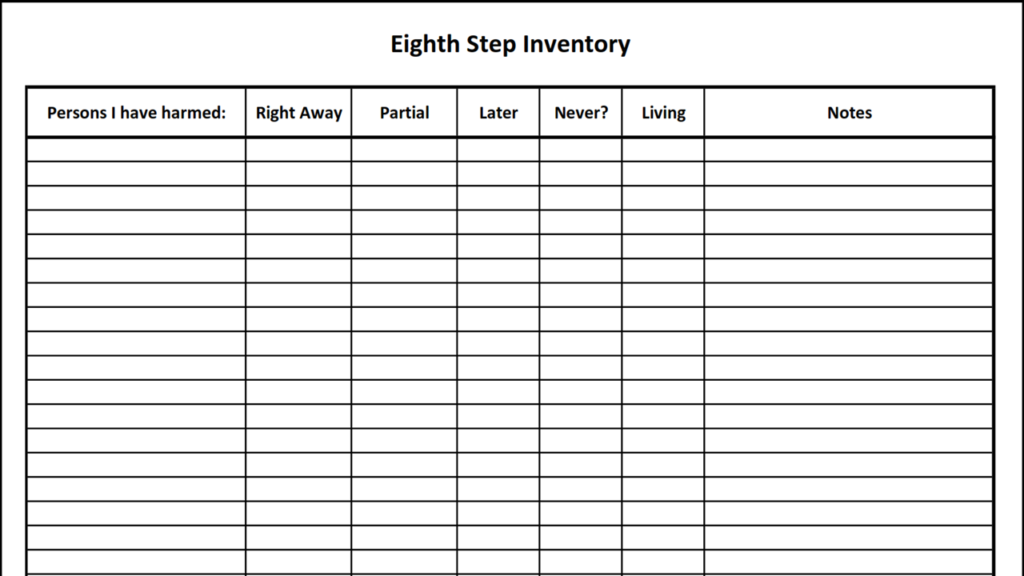
You’re going to fill this out using your fourth step Resentments and Fears Analysis sheets. Here’s an example of the Resentments Analysis sheet as a reminder.
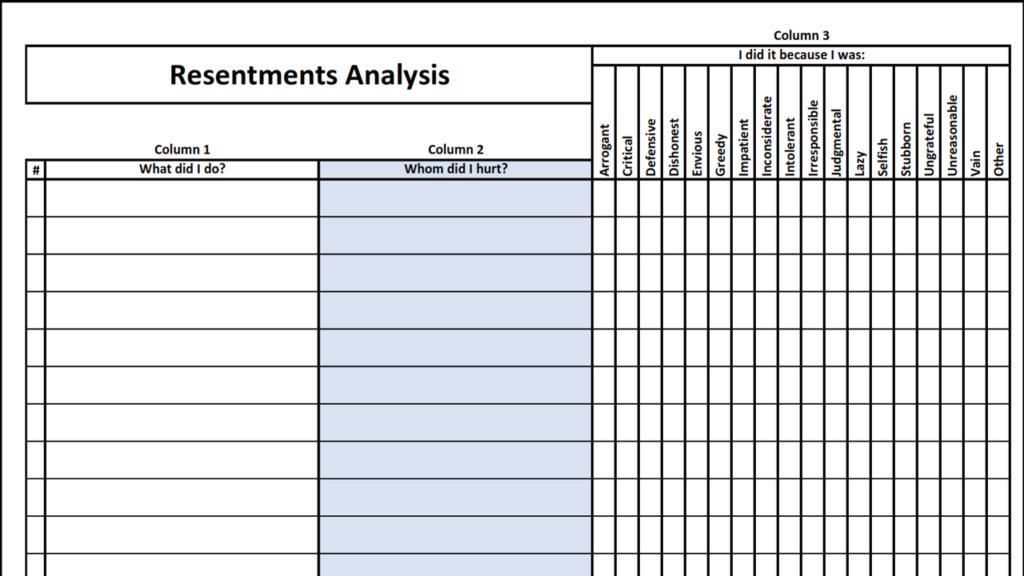
The Fears Analysis sheet should look the same. Column 2 (“Whom did I hurt?”) should be an extensive list of the people or institutions that you identified after reviewing your resentments and fears. For each name in Column 2 on the Resentments and Fears Analysis sheets, transfer the names into the first column of your Eighth Step Inventory.
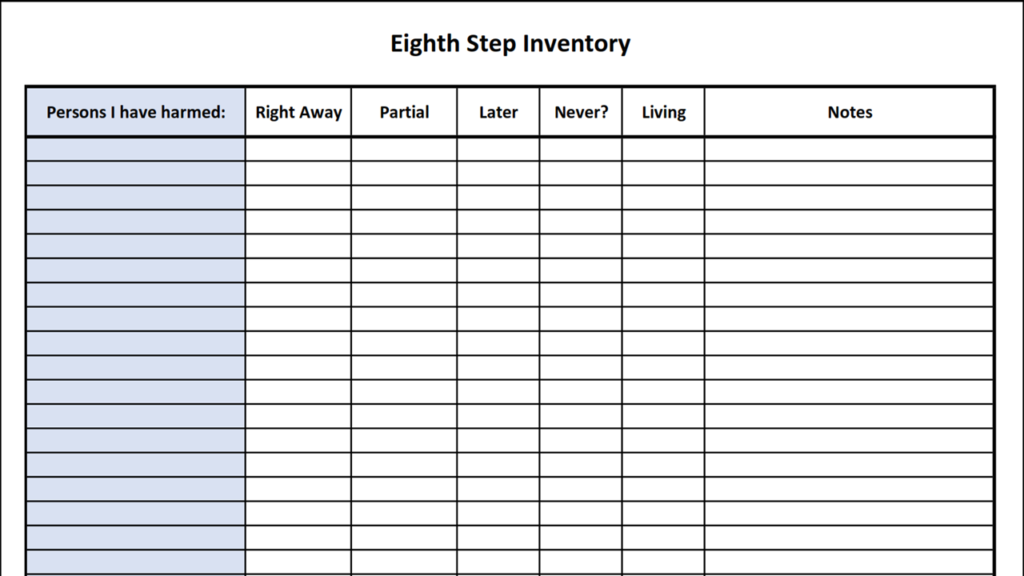
Transfer all the names but leave the other columns blank. The Notes column might come in handy for jogging your memory as you go along, particularly if there are a good number of names on the list.
There may be others who are candidates for this list.
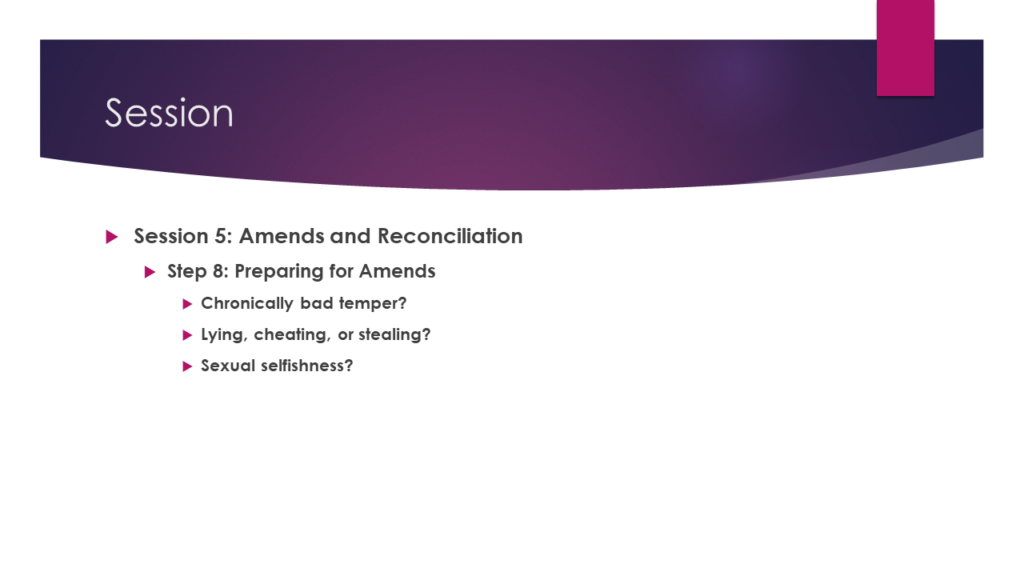
You should take this opportunity to make sure that your list is complete. Take some time to reflect on whom else you might have harmed. Can you think of anyone not already on the list whom you’ve harmed by any of these sorts of actions? If one of your defects was that you were chronically bad-tempered, was somebody hurt or offended by that? Did you lie to anyone, cheat anyone, or steal from anyone not already on your list? Was your sexual behavior offensive or abusive to anyone? Gross misbehavior is kind of obvious, but how about our less-obvious offenses?
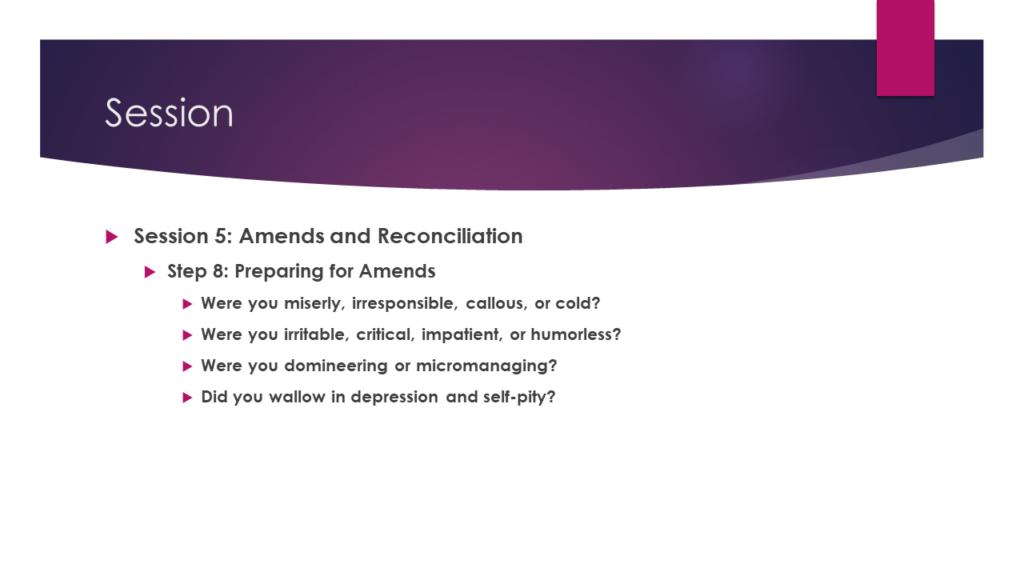
People have a right to expect basic humanity and kindness from us. Were there times you didn’t show that to someone? Were you ever miserly…or just plain cheap in your dealings with others? Have you shirked your responsibilities so that someone else had to take up the slack? How about being callous and unfeeling toward someone who deserved your understanding? Were you short, demeaning, or dismissive of anyone? Did you behave with anyone as if it was your way or the highway? Did you try to manipulate anyone by trying to make them feel sorry for you?
Once you’ve transferred all the names and added any others that you’ve just thought of, it’s time to start eliminating people. Here’s a fact that may surprise you. Some of the people on your list don’t even belong there. Whom should you strike off the list? Here’s where your trusted advisor can come in handy. Your list should contain people you have harmed, but some on your list may not belong in that category. People often get confused between giving offense and taking offense. Just because someone at some time has gotten angry or annoyed at you, doesn’t necessarily mean that you’ve done anything wrong. They may be taking offense when none was given. Think about how many times you’ve had a knee-jerk reaction and become annoyed with someone who didn’t deserve it. Other people have behaved the same way with you, and some of those people may even be on your list. For each of the people on your list who may have become angry with you, ask yourself whether you were, in fact, responsible for their becoming angry, or not. Did you actually do or say something to offend them, or were they simply taking their frustrations out on you? Be honest. Don’t let yourself off the hook too easily, but also don’t make yourself responsible for behavior that wasn’t yours. If you find anyone who fits that category, strike them off. No amends necessary. What do we do about the other names on the list?
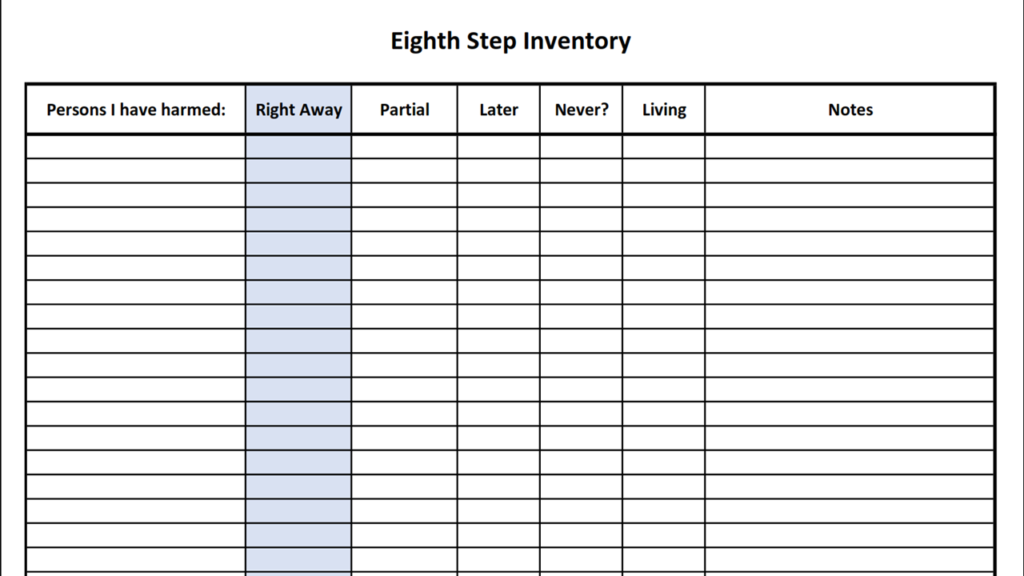
Some people (perhaps most people) on your list are obvious candidates for the “Right Away” category. You clearly know who they are, you know where to find them, and you remember the things you said or did or neglected to do that hurt or harmed them. Making amends to them will not do them further harm nor will it place you in legal jeopardy or risk harming those who are dependent on you (for example, spouse and/or children). Put an indicator in the “Right Away” column for these people. The list probably includes your relatives and close friends. These will be the easiest amends to make, so you would do best to get them out of the way first. It’ll give you good experience and make the more difficult amends easier to face. Here’s a question—do we have to make amends for everything we did?
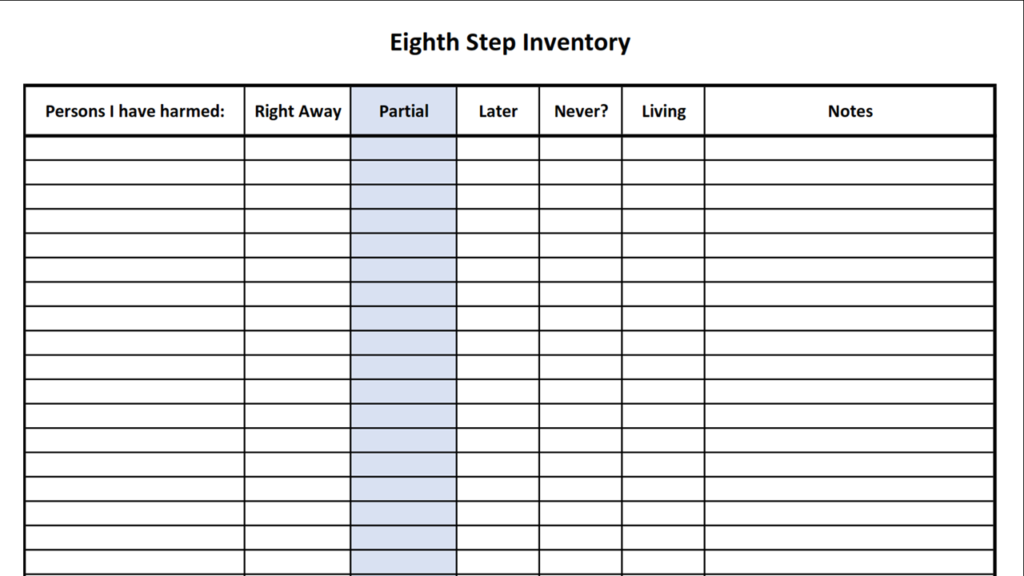
There are many reasons why you might not need or want to make full amends. This would be particularly true if some facts regarding your relationship remain unknown, and the revelation of those facts would do further harm. For example, if something you did indirectly caused harm to another person, but they were unaware of how that came about, and if the revelation of your complicity in the event would be unnecessarily hurtful or add to the damage already done, you would do best to make only a partial amends. See if anyone on your list fits this category and indicate the fact in the “Partial” column. Use the note column to remind yourself of the details. There might not be many relationships that fall into this category. What about the rest of your list?
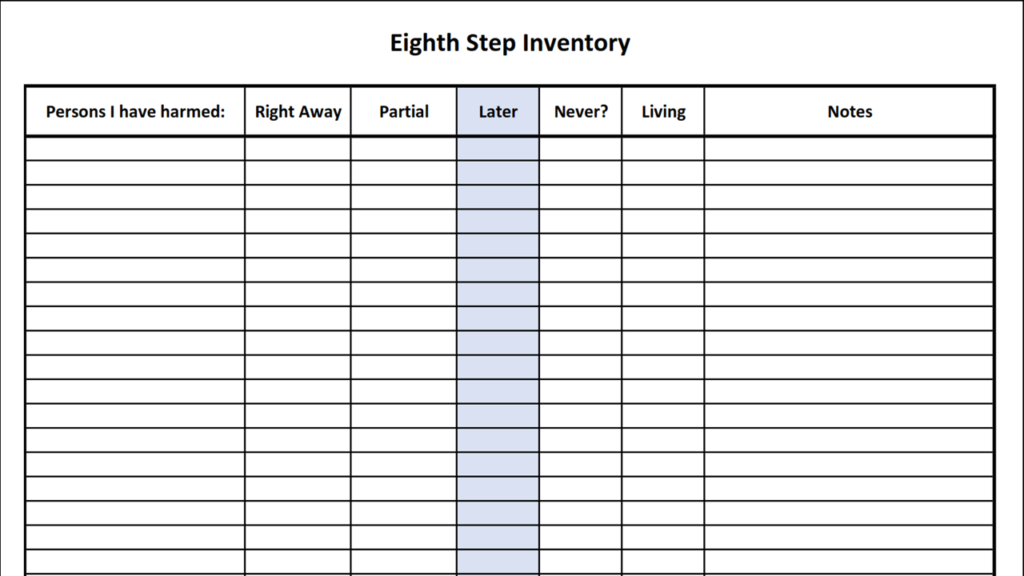
There are many reasons why you might add someone to the “Later” column on your list. Perhaps you’ve lost track of the person and would need to do research to try to find them. Perhaps you’re not sure who the person is or was, but there might be a way to find out. Or, more than likely, it’s someone you’ve hurt badly, and you anticipate a less-than-friendly reception. You may need to wait to build up your experience and courage before facing them. We’ll discuss how to deal with various kinds of receptions when we look at Step 9. In short, the people or institutions in this category will take more time and effort. If you wish to free yourself from the burdens of guilt and shame, do it carefully, but do it. Now, what about that “Never” column?
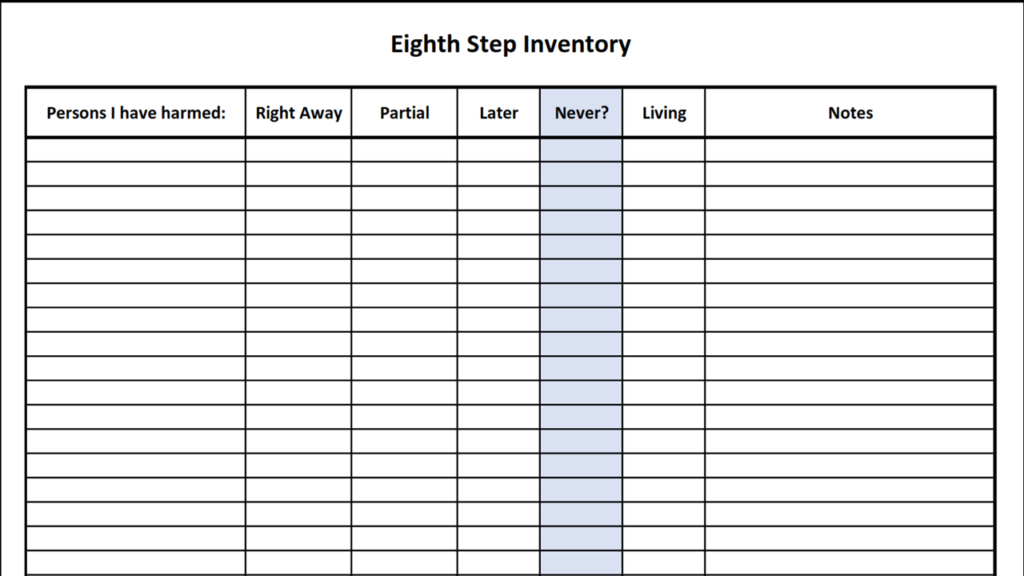
A friend of mine had a column entitled, “When Hell Freezes Over.” There may be a few entries on your list who fall into this column. These are the people and institutions who wronged you the worst and the ones who might shoot you on sight. We would hope that there aren’t many who fall into this category. These are the ones who will take the most time to complete…if at all. However, that being said, the willingness to clean up your part of the damage must remain. You’re only asked to do the possible, but you’d be surprised what becomes possible over time. I’ve heard stories many times over that when doing the steps, people have unexpectedly run into people on their “Never” list and found it possible to say, “I’m sorry for what I did.” You may not be inclined to go after these people, but you need to leave open the possibility that you could make amends if the situation arose. That’s why the question mark on the “Never” column. Never say never. Now, there’s one more column to look at.
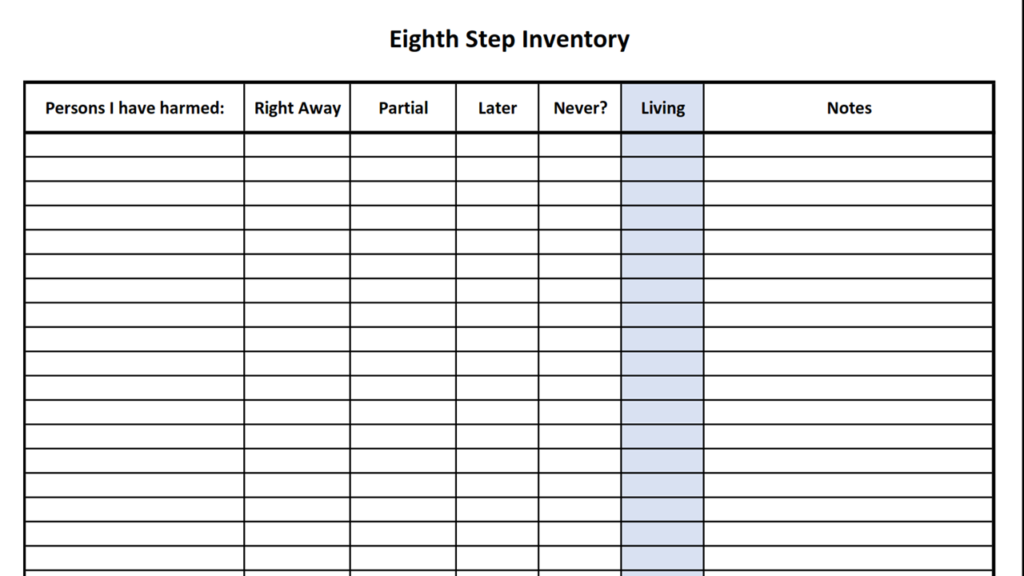
You will have people who fall into the “Living Amends” category. These are people or institutions to whom you cannot make direct amends. They are, of course, any deceased relatives and friends who’ve made it onto your list. They are also those whom you never knew. They’re random strangers you may have hurt or harmed as well as institutions that no longer exist. Perhaps you were in a position of responsibility in an organization, and you harmed the membership by neglecting your duties. The only way to make amends in these cases is to behave differently from now on. If there was a certain area in which you failed chronically, you might want to focus your attention and efforts on that area in the future.
Now, a word about organizations and institutions. Many times, these were the sources of real or imagined injustice toward us. Other times, they appeared to us to be anonymous engines of exploitation. Either way, we felt justified in causing them damage or taking advantage of them. The anonymity makes it easier to harm a group than an individual. We were oblivious to the fact that the one we were most harming was ourselves. Our harmful attitudes and behaviors toward organizations and institutions bolstered our character defects while causing injury to others—regardless of how nameless they might have been. When we owed something to organizations and institutions, we are duty-bound to repay our debts. We may do so anonymously if it’s possible, but we mustn’t avoid taking care of this. Paying back taxes with penalties and interest can be painful, but not as painful as living with the knowledge of that unfinished business. Our unfinished business saps our mental, emotional, and spiritual energy. Of course, some organizations and institutions will necessarily wind up in the “Living Amends” column. That’s all right, so long as we actually pay attention to our responsibilities in that regard.
This brings us to the end of Step 8. Here’s a hint that might help you go deeper into your spiritual healing. Did any of the people or organizations you added to your list of persons you’d harmed remind you of any resentments, fears, or wrongdoings that never made it to your fourth step inventory or analysis? For the sake of completeness, you might want to go back there and make any necessary additions or adjustments. In a very real sense here, we’re lancing old wounds in order to get rid of the infection of selfishness and self-centeredness. When you’re ready, we can go forward to conquer and complete Step 9.
